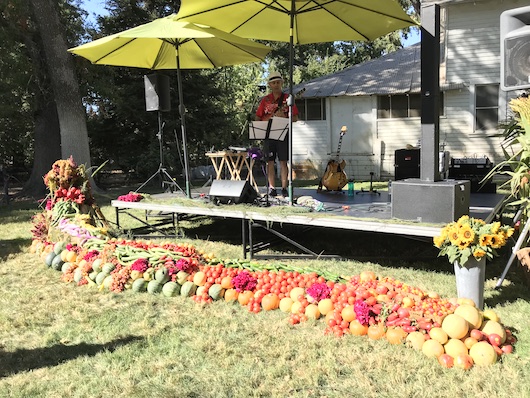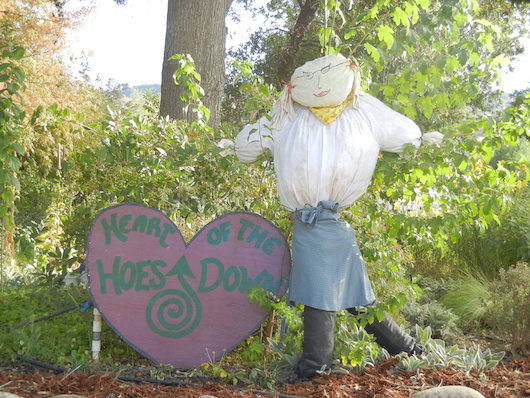
Produce cornucopia at Day in the Country —
Full Belly has been pretty busy lately. First of all, we hope to put our best foot forward for the Hoes Down Harvest Festival on October 5th and with the summer focus on harvest and crop production, many corners of the farm have been overlooked and now need to be tidied up. We hope that our CSA members are able to visit the farm for the Hoes Down since it is one of our favorite days of the year. Note that your tickets have to be bought on-line in advance this year. There will not be ticket sales at the gate.
This past weekend, on September 8th, many of us participated in the Day in the Country, an annual event of the Yolo Land Trust. Top chefs from all over the Sacramento region and the Bay Area, came together at River Garden Farms. The chefs used donated produce from Yolo County to showcase the incredible diversity of products coming from this region. The Yolo Land Trust works to conserve farming and ranching lands in Yolo County for future generations and the Day in the Country is their primary fundraiser.
Despite the many activities here on the farm, we still make time to pay attention to developments in agricultural policy and it seems important to keep our CSA members up-to-date. A July comment by Under Secretary of Agriculture Greg Ibach caught our attention. He said that he was interested in considering gene editing as an appropriate technology for organic agriculture. Since the comment was made at a House Agriculture Subcommittee meeting, it caught our attention. It is unlikely that this was just a passing thought.
There are many reasons that gene editing and genetic engineering are not allowed in organic agriculture and we are’t going to go into all of that here. Gene editing, which is a little bit different than genetic engineering, has received a lot of favorable attention because scientists propose using it for things like editing mosquito genomes so that they can no longer carry the parasite that causes malaria, or creating dairy cattle that can resist a parasite that causes sleeping sickness in sub-Saharan Africa.
The gene editing train already left the station in the non-organic food supply, when in November 2015, the FDA approved genetically altered salmon for food production. This approval came despite concerns that the genetically altered salmon could damage wild salmon populations, and of course there was no requirement that the salmon be labeled as genetically manipulated.
Perhaps the story of conventional plant breeding that has always focussed on high yield and cosmetic appeal provides a cautionary note. The unintended consequences of breeding for a few traits like yield or color has been the decline in the nutritional value of many of today’s fruits and vegetables. This was the result of an intensive conventional breeding effort over several decades. Just think of the havoc that could result when breeders speed up the process.
Another cautionary tale comes from the Hornless Holstein cows. When a U.S. startup devised a way to edit the genome of the cow to make sure that it didn’t grow horns, the resulting cows became celebrities.
The company, Recombinetics, promoted the effort saying that the cows did not contain DNA from any non-cow species. Gene editing techniques allowed them to breed quickly, resulting in a Hornless Holstein in two years instead of two decades. They simply had to take out the unwanted genes, and put in the genes that humans want. They said that the same result could have happened through “breeding in the farm yard” and they argued that FDA government oversight of the Hornless Holstein was unnecessary because no foreign genetic material had been introduced. “There are no off-target effects.”
But then, in July 2019, FDA scientists accidentally found that the Hornless Holstein genetic sequence contained genes from the lab. The lab material that was in the cow’s genome included genes that are resistant to antibiotics that are used to treat common cattle ailments. It was clear that the genes came from bacteria commonly found in the lab and used for scientific purposes. This unintended addition of DNA from a different species into the cow’s genome occurred during the gene editing process and was undetected by the company.
Such unintended alterations speak to us of the hubris of human scientists and the lack of caution that has characterized the spread of genetically engineered organisms all over the planet. After the discovery of antibiotic resistant DNA in the Hornless Holstein, FDA scientists reported that they think that gene-editing errors are under-reported and are a blind spot for proponents of the technology.
One concern is that the antibiotic resistance gene found in the Hornless Holstein could be taken up by any of the billions of bacteria present in a cow’s gut. Superbugs — antibiotic-resistant bacteria like MRSA — are a major concern of infectious disease doctors, and overuse of antibiotics in agriculture is a contributing factor.
Our recommendation to Undersecretary Ibach is to proceed with great caution when it comes to gene editing in the conventional food system and to simply stop trying to bring the technique into organic agriculture. Scientists still have a lot to learn when it comes to editing the genomes of various species. We wish that they weren’t using the food supply as their laboratory, and we say “HANDS OFF” when it comes to the National Organic Program.
—Judith Redmond

